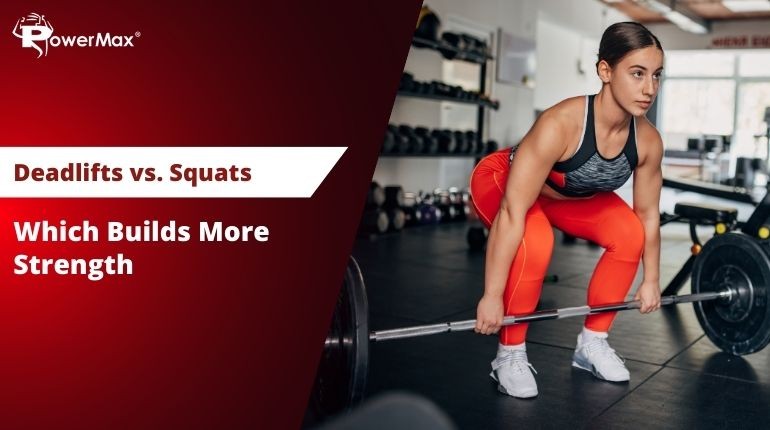
By Team PowerMax / 17 Apr 2025
When it comes to strength training, two exercises reign supreme: deadlifts and squats. Both are foundational movements in powerlifting, bodybuilding, and general strength training. But if you had to pick just one for building strength, which is superior? Let’s break it down by comparing their benefits, muscle activation, biomechanics, and real-world application.
Before we analyze which one builds more strength, let's first understand what each exercise entails.
At its core, the deadlift is a simple yet powerful movement—you’re essentially lifting a loaded barbell from the ground up to a standing position. This compound exercise works a wide range of muscles and delivers serious strength benefits. So, what muscles are firing during a deadlift? The movement primarily targets the posterior chain—your hamstrings, glutes, lower back (especially the erector spinae), and traps. But it doesn’t stop there. Your quads, core, forearms, and lats all get in on the action too, making it a true total-body workout.
Why are deadlifts so loved by strength coaches and athletes alike? For starters, they build raw strength and power by engaging multiple muscle groups at once. They’re also amazing for developing grip strength, which plays a crucial role in many sports and everyday tasks. By targeting the muscles of the posterior chain, deadlifts help improve posture and boost athletic performance across the board.
Moreover, deadlifts train your body for real-world functional strength. The movement pattern closely mimics lifting heavy objects off the ground in daily life—making it not just a gym skill, but a life skill. Plus, when performed with proper form, they can help reduce your risk of injury by reinforcing the strength of your lower back and hamstrings. In short, if you're looking to build a strong, balanced, and injury-resistant body, deadlifts should be a cornerstone of your workout routine.
The squat is a classic, powerhouse move in any strength training routine. How it works is—just bend your knees and hips to lower your body, then push back up. When done right, it’s one of the most effective exercises for building lower-body strength. Holding a barbell on your shoulders or simply using your own body weight during squats activates a wide range of muscles as your quadriceps, glutes, and hamstrings. These are the primary drivers of power as you lower and lift yourself. But the work doesn’t stop there. Your core, lower back, and calves are also heavily involved, working to stabilize your body throughout the motion.
What makes squats so powerful is that when it comes to building leg strength and muscular endurance. Since they engage so many stabilizing muscles, squats are also fantastic for improving balance, posture, and overall coordination. Athletes love squats for building explosive power, while others benefit from improved hip and ankle mobility, key for smooth, pain-free daily movement.
And here's a bonus: heavy squats stimulate the release of key hormones like *testosterone and growth hormone*, both of which play a major role in muscle development and recovery. So not only do you build stronger legs, you promote overall muscle growth too.
Muscle Activation
Deadlifts engage more muscles overall, including the upper body (traps, forearms, grip), while squats focus more on quads and core stability. Winner: Deadlift
Maximum Weight Lifted
Deadlifts typically allow for heavier lifts due to a shorter range of motion and better mechanics. Winner: Deadlift
Leg Strength
Squats provide superior quad, hamstring, and glute activation with greater time under tension. Winner: Squat
Athletic Performance
Squats enhance jump height, speed, and mobility—key for sports. Deadlifts boost power but translate less to athletic movement. Winner: Squat
Posterior Chain Strength
Deadlifts target the hamstrings, glutes, and lower back more effectively, supporting posture and injury prevention. Winner: Deadlift
Real-Life Functionality
Deadlifts mirror real-life lifting motions like picking things off the ground, making them more practical. Winner: Deadlift
Yes! For maximum strength development, you should incorporate both. Each exercise complements the other, ensuring balanced muscle development.
Option 1: Train on separate days
Monday: Squats (Leg Day)
Thursday: Deadlifts (Back/Hamstrings Day)
Option 2: Alternate intensity
Heavy squats, light deadlifts, one week
Heavy deadlifts, light squats the next week